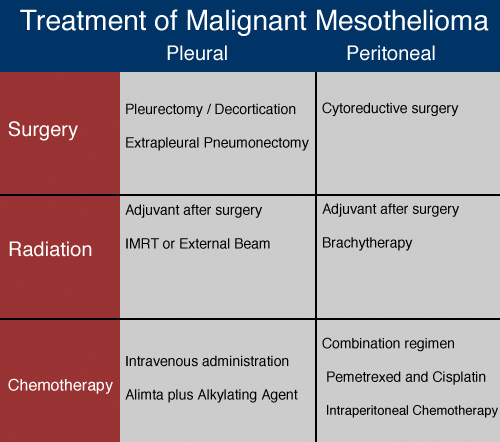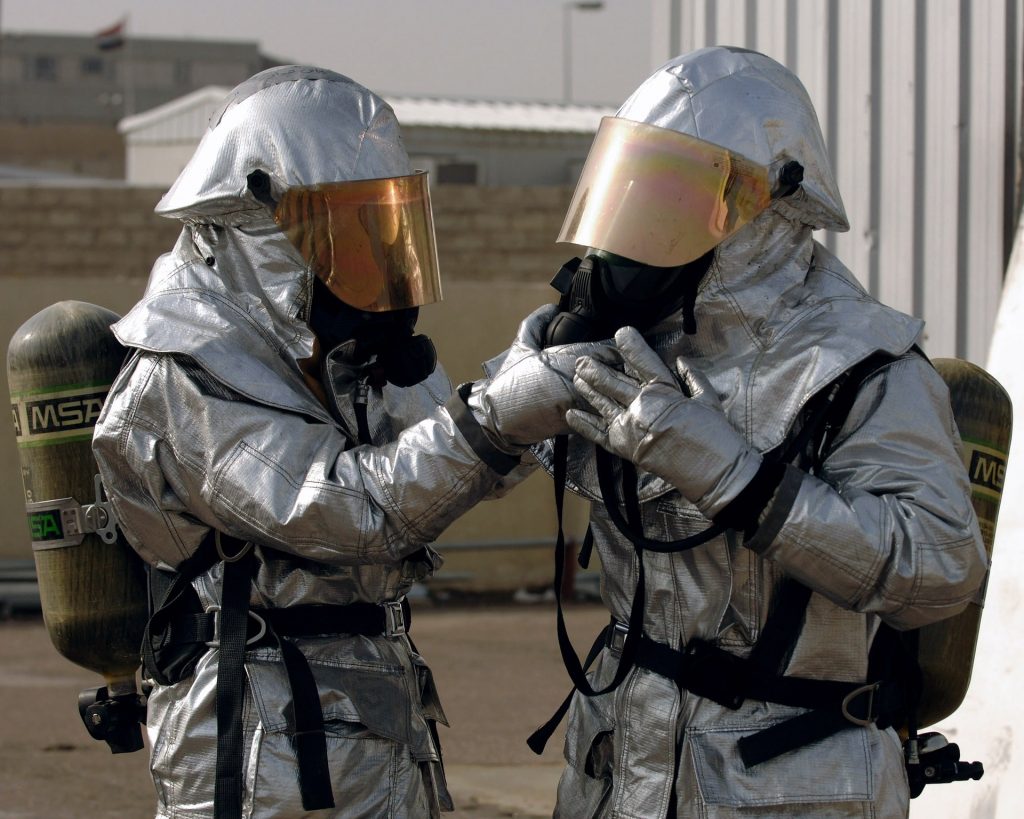Table of Contents
Mesothelioma is a rare form of cancer that can develops in the abdominal cavity (peritoneum), the envelope of the heart (pericardium), in lining around the testicles or the lining of the lungs (mesothelium). Thus, depending on the organ affected, the tumor can be called: peritoneal mesothelioma, pericardial mesothelioma, mesothelioma of the tunica vaginalis, or pleural mesothelioma (commonly called mesothelioma).
Pleural mesothelioma is the most common and more severe form of mesothelioma. It is the result of exposure and inhalation of asbestos, a mineral fiber that was widely used in a variety of building construction materials. Once inhaled, asbestos remains on your mesothelium and cause an abnormal growth in your mesothelial tissue; this medical condition is called cancer of the mesothelium or mesothelioma.
You can be exposed directly to asbestos or indirectly through friends or family members that brought the fiber home from their work on their clothes, on their hair or on their skin. Unlike many other forms of cancer, the prognosis of mesothelioma is dreadful; in general, life expectancy of mesothelioma patients is between 12 to 18 months after treatment. Over 75% of mesothelioma victims die within one year. The remaining 25% may live longer, but often in sadness and pain. However, although very rare, it is reported that some mesothelioma victims are completely recovered; therefore, do your best to be a mesothelioma victor.
Mesothelioma Incidence
Although incidence rates are increasing, mesothelioma is still relatively a rare cancer with an incidence of approximately 1 person per 1,000,000. The incidence varies depending on the lifestyle of a population; populations with high levels of smoking (it does not mean cigarette smoke cause methoselioma) can reach an incidence up to one thousand mesothelioma cases per million inhabitants.
 In addition, geographic factor may also play a role in the development of the disease. The incidence of mesothelioma is higher in Western countries. It is estimated that about 40 people per 1 000000 are diagnosed with mesothelioma in Western industrialized nations. In the United States, the incidence was estimated at 15 persons per 1 000000 in 2004. According to the Journal of American Medical Association, during 1999-2005, a total of 18,068 deaths related to mesothelioma were reported in the United States. The incidence was classified as follow:
In addition, geographic factor may also play a role in the development of the disease. The incidence of mesothelioma is higher in Western countries. It is estimated that about 40 people per 1 000000 are diagnosed with mesothelioma in Western industrialized nations. In the United States, the incidence was estimated at 15 persons per 1 000000 in 2004. According to the Journal of American Medical Association, during 1999-2005, a total of 18,068 deaths related to mesothelioma were reported in the United States. The incidence was classified as follow:
- Pleural mesothelioma: 1,572 – 8.7%
- Peritoneal mesothelioma: 657 – 3.6%
- Anatomical site: 2,605 – 14.4%
- Unspecified anatomical site: 13,454 – 74.5%.
Mesothelioma Causes and Risk Factors
Unlike lung cancer, smoking does not cause mesothelioma. The main risk factor known for the occurrence of mesothelioma is asbestos. Today, the risks of working with or near asbestos are well known and are strictly prohibited. However, it does not prevent that some occupations from exposing individual to this deadly substance. People who are more easily exposed to asbestos are those who exercise the profession of:
- Welder
- Plomber
- Shipbuilder
- Brake lining worker
- Pipe fitter
- Power Plant worker
- Boiler maker and repairer
- Insulators (those who install insulating materials)
- Miner of asbestos
- Railroad worker
- Worker in the production of fire bricks, fire-retardant paints, asbestos cement.
Mesothelioma Warning Signs and Symptoms
Mesothelioma can remain dormant in your body for many years before showing its existential signs and symptoms. The moment you feel a symptom of the disease, the cancer has already invaded and damaged the mesothelium tissue, and sometimes certain organs of your body. Most of times, at least 20 years must elapse between the first exposure and the development of mesothelioma symptoms. You can spend up to 40 years after exposure to asbestos before the development of asbestosis or mesothelioma. In fact, when symptoms finally occur, they can easily be confused with symptoms of allergies or a common cold. Mesothelioma is often discovered when patients think they have a flu or cold. In addition, mesothelioma symptoms slightly vary depending on the organ affected.
Pleural mesothelioma, affecting the lining of pleura or lung, can cause:
- chest pain
- fatigue
- chronic cough
- bloody sputum
- wheezing
- hoarseness
- shortness of breath
- Unreasonable weight loss.
Peritoneal mesothelioma, affecting the lining around the stomach and intestines, can cause:
- fever
- anemia
- bowel obstruction
- abdominal pain and swelling
- diarrhea or constipation
- Unreasonable weight loss.
Pericardial mesothelioma tends to cause:
- fatigue
- difficulty breathing
- wheezing.
Mesothelioma Diagnosis
 Due to its long silent period, mesothelioma is often diagnosed after it has reached an advanced stage. In fact, the disease is often detected during examination for other common diseases such as influenza and pneumonia. In the U.S., about 3,000 people are diagnosed with mesothelioma each year.
Due to its long silent period, mesothelioma is often diagnosed after it has reached an advanced stage. In fact, the disease is often detected during examination for other common diseases such as influenza and pneumonia. In the U.S., about 3,000 people are diagnosed with mesothelioma each year.
Diagnostic procedures commonly performed to diagnose mesothelioma include:
PET scan – the positron emission tomography (PET) scan allows your physician to visualize the size of the tumor and organs affected. This exam also helps your oncologist to determine the type of treatment to use to better combat the disease.
Chest x-ray – this radiographic exam is often included in the diagnosis of mesothelioma. Along with the PET scan, chest X-ray helps your oncologist to detect pleural thickening, which can indicate presence of asbestos particles.
Biopsy – several types of biopsy can be done:
Thoracoscopy – the thoracoscopy is an important exam in the diagnosis of mesothelioma. It helps your physician to do an assessment of the spreading of the tumor and determine the type of treatment will be most appropriate. It is a surgical procedure during which a tiny video camera is inserted into your chest cavity which allows the surgeon not only to visualize your chest tissue but also to take sample for laboratory analysis.
Laparoscopy – while you are under anesthesia, your surgeon makes small incisions into your abdomen, and then inserts a tiny video camera called endoscope. This procedure allows him to observe the abdominal cavity and remove samples of tissue. The tissue samples collected are then analyzed under a microscope to search for cancer cells.
Thoracotomy – this procedure is performed, under anesthesia, by a specialist in thoracic surgery. The surgeon makes an incision in your chest wall to examine the thoracic organs: heart, lungs, esophagus, thoracic aorta, and the inner part of the vertebral column. If he finds abnormalities that indicate mesothelioma, he will take sample for testing.
Laparotomy – During this procedure, your surgeon makes a large opening in your abdomen from the pubis to the sternum. This incision allows him to have direct access to the abdominal and pelvic organs. Sample will be taken to be examined under microscope to search for asbestos fiber or cancer cells.
Staging
Once the mesothelioma is found in your body, your doctor will determine its stage. Knowing the stage of the tumor is very important; it helps your doctor to choose the appropriate treatment, and determine the prognosis.
There are several methods used to describe mesothelioma stages. The most common is the use of Roman numerals: I, II, III and IV, which reads as stage I, stage II, stage III, and stage IV. A higher number indicates a more serious mesothelioma. In general, mesothelioma stages include the following:
- Stage I – the cancer has not affected the ganglia; it remains in your right or left pleura. At this stage, the tumor is localized in one side of your chest.
- Stage II – at this stage, the cancer has reached the pleura on one side and spread into the lymph nodes near the lung. The tumor can also spread to the lungs, pericardium or the diaphragm.
- Stage III – at stage 3, the mesothelioma becomes more serious. It can affect the chest wall, muscles, heart, lymph nodes, esophagus or other organs in the chest that are in the same side as the primary tumor.
- Stage IV – In this final stage, the disease have a complete control over your body. The mesothelioma has metastasized from the primary tumor into distant areas: the brain, lymph nodes in the chest, organs of the abdominal cavity, or the neck.
Mesothelioma Treatment
Mesothelioma is often discovered at an advanced stage when the tumor is very aggressive; that is why the treatment is often ineffective. The type of treatment depends on your age, your health, stage of the cancer and organ affected: lungs, brain, lymph nodes, etc. several therapies can be used to mesothelioma, before starting the treatment, talk to your physician to determine which option is best for your condition.
Conventional mesothelioma treatment includes surgery, radiation therapy and chemotherapy. Sometimes, these treatments are combined to increase your survival chance.
Surgical treatment
Surgery can be performed to remove the tumor or a part of it. However, before considering surgery, your doctor will evaluate the course of the disease. He will evaluate your health carefully to determine whether the functions of your lung and heart are normal. In addition several exams should be performed to determine whether the cancer has spread into other parts of your body or not. If these conditions are not verified, surgery cannot be an option in the treatment.
The following surgical intervention can be performed in the treatment of mesothelioma:
Extra pleural pneumonectomy – this is an aggressive procedure used mostly in the treatment of mesothelioma; it consisting of removing the lung, pleura, diaphragm and pericardium. The purpose of this surgery is to physically remove as much tumor as possible. This is a risky procedure; it is often performed on patients who are young and are able to undergo major surgery.
Pleurectomy / decortication (P/D) – this surgical procedure is performed mostly when the tumor is advanced. It involves the removal of the pleura to reduce the symptoms and pain caused by the cancerous mass. In addition, pleurectomy may also prevent or stop the recurrence of pleural effusion.
Radiation therapy
Radiotherapy is often used in the treatment of mesothelioma. This method consisting of exposing the cancerous tissue to an emission of radiation to alter the composition of the genetic information of the cancer cells, thus prevent them from multiplying. Unlike chemotherapy, radiotherapy is a local treatment; it acts directly on the region of your body exposed to the radiation source. The radiotherapy treatment is sometimes used immediately after surgery in addition with chemotherapy to prevent metastasis.
Chemotherapy
Chemotherapy is a systematic treatment consisting of using drugs that attack and destroy cancer cells. Some of these medications can be administered orally, others intravenously. Depends on the severity of the disease and the state of your health, chemotherapy may contain a single drug (monochemotherapy) or many chemical agents (polychemotherapy). Polychemotherapy tends to cause more adverse effects, but it increases your chance of surviving. Therefore, if you are young, you will mostly be recommended polychemotherapy. Certain medications that are currently used in chemotherapy to fight mesothelioma include:
- Cisplatin
- Mitomycin-C
- Pemetrexed (Alimta)
- Cisplatin (Platinol)
- Vinorelbine (Navelbine)
- Gemcitabine (Gemzar)
- Carboplatin (Paraplatin)
- Doxorubicin (Adriamycin)
Unfortunately, those medications are always associated with side effects; some of common mesothelioma drugs adverse effects include:
[row][double_paragraph]
- Hair loss
- Nausea
- Vomiting
- Fatigue
- Rash
- Diarrhea
- Easy bruising or bleeding
- Numbness
- Tingling
- Loss of appetite
[/double_paragraph][double_paragraph]
- Muscle pain
- Blurred vision
- Kidney damage
- Hearing loss
- Hypocalcaemia
- Ringing in the ears
- Painful urination or red urine
- Damage to nervous tissue
- Loss of balance
- Blood cells in the bone marrow.
[/double_paragraph] [/row]
Note: it does not mean you will develop all those side effects. In fact, some patients barely experience problem with those drugs. To decrease your risk of side effects, eat plenty of fruits and cruciferous vegetables; drink plenty of fluid. You may need a power juicer to extract the juice.
Homeotherapy
Homeotherapy is another treatment often used to fight mesothelioma and all other forms of cancer; it includes herbs and acupuncture. Unfortunately, none of these methods has been proven to be effective treat mesothelioma once it reaches an aggressive stage.
Mesothelioma Prognosis (Survival Rate)
Prognosis for mesothelioma depends on many factors: the extension of the tumor, stage, your state of health, etc. However, despite the very significant progress in medical science, the mesothelioma prognosis is still alarming; the majority of mesothelioma patients do not live long after the treatment. in fact, some even die during the treatment.
Over 75% of mesothelioma victims die within one year following the treatment. However, although very rare, it is said that some mesothelioma victims are completely recovered.
A mesothelioma diagnosed early (stage 1) has a better prognosis and better treatment options. Therefore it is important to see your doctor regularly if’ you are at risk for mesothelioma.
The overall five-year relative mesothelioma survival rate for 1998 to 2002 was approximately 9 percent. The following are the relative survival rates for each year following a mesothelioma diagnosis:
- Year 1 survival rate: 39 percent
- Year 2 survival rate: 20 percent
- Year 3 survival rate: 11 percent
- Year 4 survival rate: 10 percent
- Year 5 survival rate: 9 percent.
Mesothelioma Prevention
Preventing mesothelioma is the best option. Mesothelioma is a slow but an unstoppable killer; once you have it, you have it for life; your chance to be cured from it is very, very minim. If you feel that you work in an industry at risk of exposure to asbestos, you have to take all necessary measures to protect yourself from exposing and inhaling of asbestos. It is important to discuss your health concerns with your employer and require that he/she provides physical protection required by law to eliminate your risk of developing the mesothelioma or asbestosis.
 However, although it is legally the responsibility of your employer to provide safety devices against asbestos, it is your responsibility to protect your health and the health of your family. If your employer is negligent or refuses to provide your safety, do your duty; contact an agency to support you right away. Your employer will be obliged to comply with the law. If you have been exposed to asbestos, early screening by chest x-ray may help prevent the mesothelioma or its complication.
However, although it is legally the responsibility of your employer to provide safety devices against asbestos, it is your responsibility to protect your health and the health of your family. If your employer is negligent or refuses to provide your safety, do your duty; contact an agency to support you right away. Your employer will be obliged to comply with the law. If you have been exposed to asbestos, early screening by chest x-ray may help prevent the mesothelioma or its complication.
Quit smoking – If you are a smoker and have been in contact with asbestos, stop smoking and have a chest x-ray annually to reduce the risk of lung cancer and other pulmonary infections.
Lifestyle – exercise regularly, eat a healthy diet, avoid stress and sleep for at least 7 hours every night can help you have a healthy immune system, and delay or stop the development of mesothelioma.
Mesothelioma Lawsuit
The law forbids all industries to expose their employees to asbestos. If your employer neglects or refuses to provide you all necessary security you need and you develop mesothelioma, it is important that you contact a lawyer to support you immediately; you will be rewarded according to law. Now days, authorities in many countries in the world have passed laws prohibiting the use of asbestos where it represents a threat to human being.
Mesothelioma attorneys can help you punish the people who make you become a victim of the disease. They will help you collect large sums of money, allowing you to pay your bills and have a stable financial life for the rest of your life with the illness.
Always hire mesothelioma lawyers who are competent that can hear your case and help you determine the course of action to take. In countries like the United States, you can find many mesothelioma attorneys full of experiences that are ready to guide you step by step if you have been diagnosed with asbestos cancer or mesothelioma. You can contact one of our lawyers; they will sit down with you and help you get the compensation you deserve.



